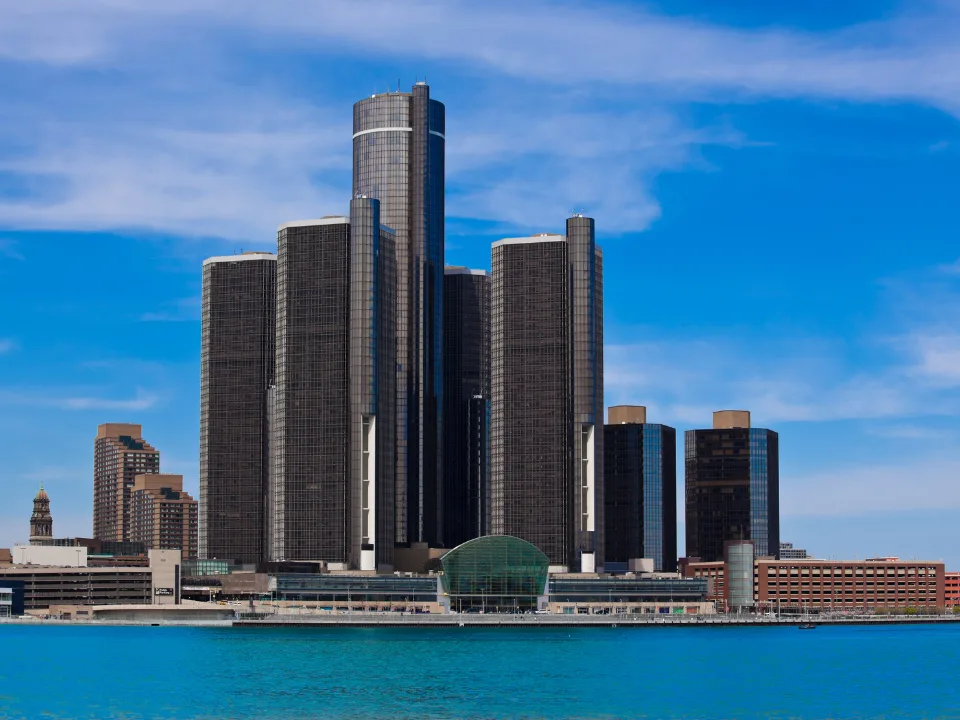- GM and Daniel Gilbert’s Bedrock propose a $1.6B redevelopment of the Renaissance Center, aiming to transform it into a mixed-use hub with housing, public spaces, and entertainment.
- The ambitious plan requires $350M in public subsidies, sparking debates among legislators and taxpayers over the appropriate use of public funds for private-sector projects.
- Developers argue the project is crucial for Detroit’s downtown revitalization, but critics say funds should be targeted at broader city improvements.
General Motors (GM) and billionaire real estate developer Daniel Gilbert are collaborating on a $1.6B redevelopment of the Renaissance Center, also known as RenCen, an iconic but controversial Detroit landmark.
Developers say the redesign will transform RenCen from a “concrete labyrinth” into a vibrant and connected urban space, as reported by WSJ.
A Brave New Vision
Opened in the 1970s as a futuristic “city within a city,” RenCen was intended to symbolize Detroit’s rebirth. Its signature feature, a 73-story cylindrical tower, is the city’s tallest building and will be preserved in the redevelopment.
The ambitious proposal includes demolishing two of RenCen’s five towers and revamping the remaining structures to incorporate housing, a hotel, and public amenities.
However, the plan’s $350M public subsidy request ignited a heated debate over the use of taxpayer money in economic development projects.
The proposed overhaul includes:
- Demolition of two towers and a podium that critics say isolates the complex from the rest of downtown.
- Additions of residential units, a waterfront park, and an entertainment district.
- Revitalization of the tower, turning it into a mixed-use space with luxury apartments and a modernized hotel.
Get Smarter about what matters in CRE
Stay ahead of trends in commercial real estate with CRE Daily – the free newsletter delivering everything you need to start your day in just 5-minutes
Funding Controversy
GM and Bedrock’s proposal relies on a significant public investment of $350M. Critics, including Michigan House Majority Leader Matt Hall, question the need for public funding when private corporations, particularly GM and Gilbert, are financially capable.
“People need [public funds] for roads more than the corporations need it,” Hall explained.
Without public support, GM has suggested it may demolish RenCen and leave the riverfront site for future redevelopment, a scenario some fear would leave a void in Detroit’s skyline.
Supporters argue that public funding is necessary to prevent the site from falling into disrepair, with Bedrock CEO Kofi Bonner emphasizing the project’s long-term benefits for Detroit.
Economic, Social Impacts
Proponents of the redevelopment believe it will:
- Spur economic growth by attracting residents, tourists, and businesses.
- Enhance the riverfront’s development potential, including Bedrock’s 40-acre holdings.
- Preserve and modernize an iconic structure central to Detroit’s identity.
However, skeptics argue Detroit’s recovery has been uneven, with downtown receiving disproportionate investment while other neighborhoods languish.
“The idea that Detroit has rebounded is a misnomer,” said Craig Wilkins, an architecture professor at the University of Michigan. “Downtown is doing well…But the rest of the city is not seeing the same kind of investment.”
Looking Ahead
With Detroit’s City Council and Michigan lawmakers weighing the subsidy request, the project’s future remains uncertain. If approved, the redevelopment would mark one of the largest office-to-mixed-use conversions in the US, setting a precedent for public-private partnerships in urban revitalization.
As cities nationwide grapple with balancing corporate incentives and taxpayer priorities, Detroit’s RenCen transformation could become a case study in navigating these contentious debates.o benefit from its performance and strategic flexibility.adhering to regulations will be crucial as its role in multifamily operations expands.
















